Fadi Zaghmout | فادي زغموت's Blog
November 18, 2025
November 2025: When University Presses, Reviews, and Festivals Align
I finally got time to sit and reflect on what happened in the past 3 weeks. As usual with such trips, all I can say is that it hasn’t been less than magical. The whole thing was amazing; starting from attending the Les Utopiales sci-fi conference in Nantes, then flying over to Toronto for the Festival of Authors, and going to Tucson to visit Fil’s sweet parents, then a 4th visit to the University of Alabama, and exploring Atlanta before heading back to Amman — a city I haven’t visited before.
 With Fil’s family in Tuscon
With Fil’s family in TusconAlong with all the action of flying between cities and continents, running from a conference to another, and talking to different audiences about my books, I received more love from Lithub (one of the most popular literary portals) in the form of listing The Man of Middling Height alongside 16 other Great Books in Translation From University Presses published this year. And even before embarking on this trip, just a few days from leaving Amman, The Man of Middling Height received an amazing review on Strange Horizons — one that I shared before but can’t stop talking about. And to top it off, Harvard Bookstore in Boston put the book in their window for University Press Week — hurray!
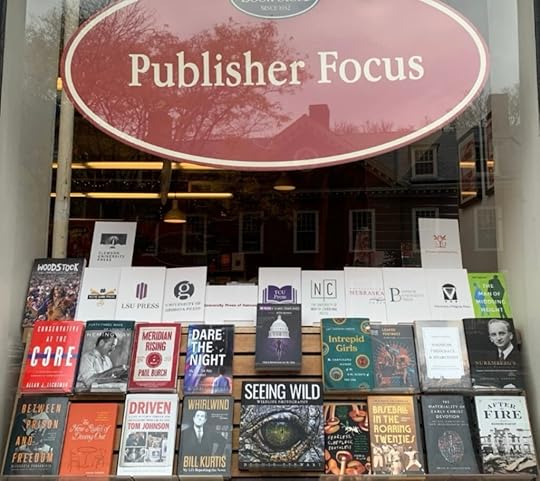 Harvad Book Store Window Nov 2025
Harvad Book Store Window Nov 2025Looking back and thinking about the planning I put into this trip, it sounds like a crazy thing to do. I was too ambitious trying to attend two important conferences across the ocean happening at the same time, and on top of that, planning more events in the US. But hey, I DID it! I managed to make it work; three nights in Nantes, two Nights in Toronto, a week in Tucson, three nights in Tuscaloosa and 10 days in Atlanta. All the stress is behind me now. It was even crazier because I had to wait until the last minute to finalize the planning. Although I applied for it back in July, the Canadian Visa only arrived three days before I left Amman. My contingency plan was to fly from Nantes to NYC instead of Toronto, but I didn’t have to.
Anyway!
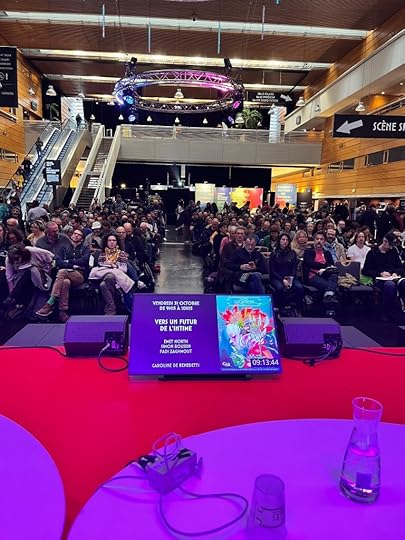 Les Utopiales 9:15am session! Les Utopiales
Les Utopiales 9:15am session! Les UtopialesLes Utopiales was literally amazing. The planning, the crowd, the set up, the conversation, the engagement, and the excitement about science fiction and imagining the future. I was IMPRESSED. I didn’t realize how big scifi and fantasy are in France. People were queuing early in the morning to enter the venue. There were queues in front of each and every session, sometimes 30 minutes before the doors opened. I have never seen anything like that. The conference’s bookstore was huge, always busy, and full of beautiful covers for new releases of books that make you wish you could read French. I have always been fascinated by the love of the French for books and literature, but today, after Les Utopiales, I am in more awe. Respect! At the same time, it made me feel sad about the number of sci-fi produced books in the Arab world. It made me think that if we were to plan such a festival in one of the Arab cities, the bookstore would have a single table, with a number of books that wouldn’t exceed one’s fingers. Hope that changes with time as literary production is thriving all over the Arab world, and science fiction is a genre with a great potential that is still untapped.
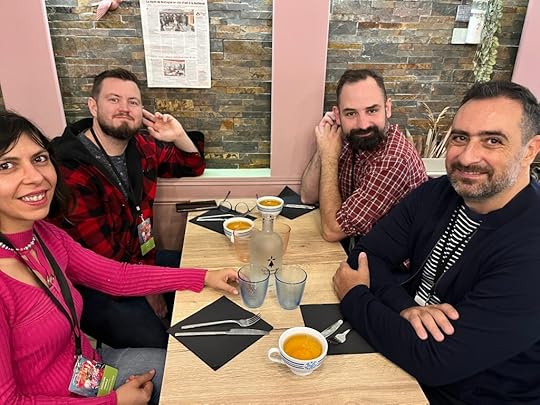 Lunch with Hikaya’s team
Lunch with Hikaya’s teamI was really happy to meet Hikaya’s team again, my awesome French publishers Davide Knecht and Romain Delplancq. I enjoyed witnessing their enthusiasm and passion for connecting with fellow players in the industry, and I am so thankful for their hospitality and their faith in me and my writings.
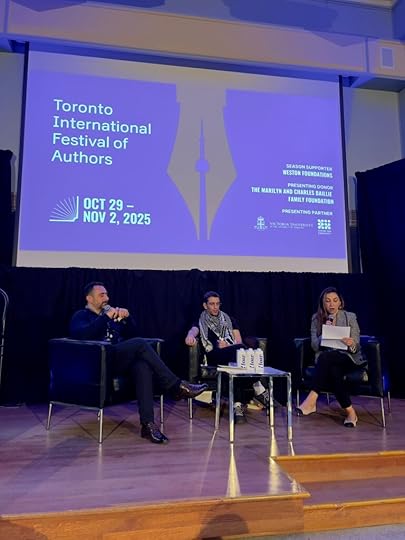 Quiet Revolutions panel: Ziyad Saadi and Fadi Zaghmout, moderated by Samia BadihTIFA
Quiet Revolutions panel: Ziyad Saadi and Fadi Zaghmout, moderated by Samia BadihTIFAToronto’s Festival of Author felt more cozy, taking place at the historical Victoria College at the University of Toronto. My arriving for the last day of the festival meant that I had to miss most of the fun. Nevertheless, it was wonderful connecting with one of my dearest friends Hani Yakan again after three years of him leaving Dubai. Hani used to work at Emirates Literature Foundation in 2022 when he moderated the session launching the Arabic version of The Man of Middling Height (Ibra wa Kushtuban), now he is an event producer at TIFA, and he managed to invite me to the festival to have a proper launch for the English version (Thank you Hani).
 With Hani at TIFA
With Hani at TIFAIt was also cozy as other friends showed up; Fil, Nadeem, Moe, Len and Ted, and Ward (a Syrian avid reader who used to live in Amman but moved to Canada recently. I knew him online and it was the first time we met in person — Thank you for coming Ward). It was great meeting Samia Badih, the amazing moderator who moderated my session, and my fellow author and panelist, Palestinian Canadian author Ziyad Saadi. I don’t want to miss anyone, but I was also happy to meet Festival Director Roland Gulliver, other festival staff, and other participating authors, especially Catherine Newman (such a sweet person).
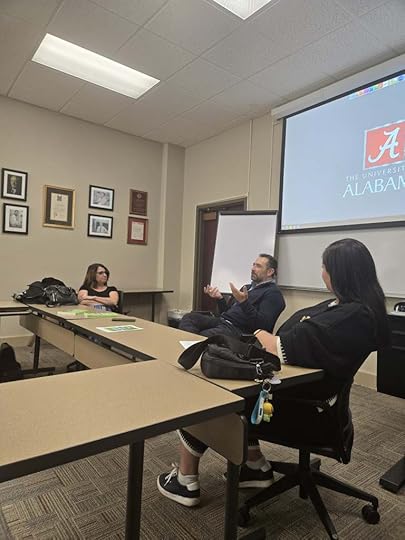 Talking about The Man of Middling Height University of Alabama
Talking about The Man of Middling Height University of Alabama I was there in April this year to talk to the students of Women in the Arab World class (ARB 363) who read The Bride of Amman. It always makes me proud to think that one of my books is being taught in an American University. This time, my visit had two purposes; to talk to the students who read the book this semester, and do an event for my newly released book The Man of Middling Height. It was so wonderful meeting Prof. Cheryl Toman again, Cheryl who supported me through the entire process of getting a publisher for the book and wrote a wonderful afterword for it (I can’t thank her enough). It was also wonderful meeting again other teachers of the Arabic program, Prof Safa El Naili and Ibrahim Khalaylih — great people whom I love and respect.
 With student of Women in the Arab World class
With student of Women in the Arab World classI know it is a lot to capture. A lot to remember. And much to be thankful about. This trip has been rewarding to me on so many levels, some of which I haven’t mentioned here. But all in all, it fills my heart with joy to connect with all of these people, and feel all of the love and support.
Thank you, thank you, thank you. I love you all.
October 21, 2025
Amazing review for The Man of Middling Height published on Strange Horizons
A new comprehensive review for The Man of Middling Height got published yesterday on Strange Horizons by Kyle R. Garton, a professor of American literature who studies, teaches, and writes literature about religion, multiculturalism, and economics, among other topics.
Overall, this novel richly exploits science fiction’s great capacity to imagine the otherwise and denaturalize what seems inevitable and natural. The adventurous analogy between height and gender will surely provoke much discussion, and—hopefully!—controversy. This might be my own bias as an academic, but in addition to being a good read for any speculative fiction fan, I think this would be an especially excellent book to assign in a college course in literature or Gender Studies as a way of bringing feminist theory to life.
Kyle R. Garton
I have been waiting for such reviews since I wrote this book! It is comprehensive, detailed, captures all the nuances of the book, and published in one of the most important literary speculation fiction magazines!
Thank you Kyle, I loved every word!
Read Full ReviewOctober 18, 2025
ليس في النّص ما يكفي من جسد – إثنوغرافيا ذاتيّة جمعيّة للنساء
حين تواصلت معي مريم الدّجاني، وعرضت شاكرة، أن تُرسل لي نسخة من الكتاب، لم أعرف ماذا أتوقّع منه. ربّما لأنّ العنوان الطويل، رغم بلاغته، لم يوحِ لي بجودة محتواه. كذلك الغلاف، رغم اللوحة التعبيرية التي زيّنته، يسبح في فضاء من اللون الأبيض يُخفي خلفه طيف مُلوّن من القصص والشهادات والمشاعر المختلفة. كما أنّني أعترف، بتقصير منّي في التعرّف على أسماء المؤلّفات وكتاباتهم وإنتاجاتهم الأدبيّة السّابقة.
لكنّي ما أن جلستُ مع الكتاب وبدأت بقراءة أول فصوله، وإذ بي أُشد لاكتشاف تفاصيل هذا المشروع. ووجدتُ نفسي أمام عمل أردني أدبي في غاية الأهمية، عمل يجمع تسع أديبات أردنيّات، يملكن من البلاغة الكثير، ومن الجرأة ما تُرفع لها القبّعات احترامًا، لسرد علينا شهادات حيّة صادقة عن حياتهن كنساء وكيفية تعاملهن مع أجسادهن في مواقف مختلفة وأعمار متباينة داخل مجتمع يحمل ميراث ثقافي صعب وكثيرًا من الأحكام المُسبقة على المرأة وجسدها وهويتها وكيانها.
من اكتئاب ما بعد الولادة، إلى التعامل مع صدمة الدورة الشهرية وآلامها، التطرق إلى جنسانيّة المرأة وتعاملها مع التغييرات الجسدية التي تطرأ عليها في منتصف العُمر، سن اليأس، العزوف عن الزواج، الاختيار بين التفرغ لرعاية الأطفال أو مسار مهني واعد، وغيرها الكثير من الشهادات والخواطر والمشاهد التي توثّق تجارب النّساء في الأردن.

مُنذ صدور عروس عمّان في عام ٢٠١٢ وأنا أتمنّى رؤية المزيد من الأعمال التي تتطرق إلى المرأة ومعاناتها وحياتها، تلك التي تنقل صورة صادقة عن واقع النّساء هنا. ورغم أنّ صوت المرأة الأردنيّة قد يكون مُهمّشًا إلى حد ما، لكنّها لم تكن يومًا صامتة. فهي طالما كتبت ودوّنت وسخّرت قلمها وتفكيرها وخيالها لتروي علينا قصصها وتحكي لنا حكاياتها. اليوم يُضاف هذا العمل الجريء للأعمال النسائية المهمة الواجب قراءتها.
تقول مريم الدّجاني في شهادتها: «أشعرُ أنّني مختونةُ الفم عندما لا أتمكّن من الحديث بحريّة».
وأنا أضيف إلى كلامها بأننا بحاجة إلى المزيد من الأعمال التي ترفع سقف الحرية وتحارب ختان الفم للنساء والرجال ولكل من يحمل شهادة صادقة تستحق السّرد.
شكرًا مريم الدّجاني، وشكرًا لبقية المؤلفات: ءلاء جانبك، أسيل فاخوري، تغريد أبو شاور، دانا جودة، رنيم أبو رميلة، ضحى أبو الزيت، علا خليل ويارا زريقات.
October 9, 2025
الفصل الأول من رواية فرح على الأرض
تقر السردية الدينيّة بأنّ إكرام الميت دفنه. تعود روحه إلى خالقها لتُحاسب على ما اقترفته من أفعال، فيُجازى بحياة في نعيم أبدي أو يُعاقب بعذاب لا ينتهي. عهدناها مسلّمة، توارثناها عبر الأجيال. عرفتُ يوم مات أبي أنّه ذاهب من دون رجعة. وحين رحلت أمي، سلّمتُ بغيابها وتجرّعتُ مرارة فقدانها من دون اعتراض على حكمة الخالق. «هُم السّابقون ونحن اللاحقون».
لكنّ ذاكرتي تخونني في استرجاع المشاعر التي حلّت بي حين جاء وقتي. حُرمت من إدراك لحظة الموت مثل باقي البشر لأنّ ملاك الموت لم يزرني نتيجة إصابة بذبحة صدرية أو تعرّض لحادث قاتل، وإنّما لازمني كظل قاتم لسنوات طويلة؛ سحب الزهايمر الحياة من شراييني تدريجيًّا. مدّ أذرعه ببطء ليخنق روحي ويطفئ النّور عن عالمي، تاركًا أفراد عائلتي وأحبّائي والمقرّبين منّي عاجزين عن حمايتي حتى مُت. وحين عاد إليّ الوعي بعد سنوات طويلة، أخبروني أنّ موتي لم يختلف عن موت باقي الخلق.
غادرت روحي جسدي كأي روح أخرى، تاركة إيّاه جُثّة هامدة بلا حياة. غسلوني كما يُغسل الموتى وصلّوا عليّ كما تجري العادة، ولفّوني بكفن أبيض قبل أن يدفنوني تحت الرمال في أرض مزرعة العائلة في منطقة العالوك.
لم أشك في حكمة الخالق التي تقضي بأننا خُلقنا من تُراب وإلى التُّراب نعود، ولم أتصوّر أن الأمور ستختلف يومًا في المستقبل. غابت عنّي حقيقة أنّ الثّبات محصور بالله وحده من دون غيره، وأنّ إدراكنا لحكمته كان، وما زال، وسيبقى قاصرًا.
«شو هالحكي؟ عم تمزحوا معي شكلكم!»، اعترضت على كلامهم حين أخبروني أنّي مُت لمدّة مئة عام. ضحكت وأنا أتنقّل بين وجوههم المبتسمة قبل أن أضيف: «مجنون يحكي وعاقل يسمع».
عجز عقلي عن تخيّل وصول العلم إلى مرحلة يكفل فيها توفير القدرة لنا على إضافة فقرة إلى دورة حياتنا، لتتلو عودتنا إلى التراب، عودة أخرى إلى الحياة.
«هاي شكلها الكاميرا الخفيّة؟»، تهكّمت على جنّة لأنّي لم أصدّق كلامها. أدرت وجهي عنها ومددت ذراعي نحو من قدّموه لي على أنه حفيدي وطلبت منه: «أمَل حبيبي، قرّب اقرصني».
ضحك مُلتزمًا مكانه إلى أنّ تأكد من أنّني لا أمازحه.
اقترب منّي بعد ذلك وقرصني بخفّة.
لم يطرأ عليّ شيء.
صمَتُّ محتارة، غير قادرة على تصديق ما يدور من حولي. انتظرت دخول جمال إلى غرفة المستشفى لأطلب منه: «ماما حبيبي، تعال بالله عليك اُقرص إنتَ كمان، أمَل ما بعرف يُقرص منيح».
وحين فعل ولم يتغيّر في واقعي شيء، وضعت يدي على خدي وتساءلت: «هل أنا في حلم أم في علم؟»
«أقرص مرة تانية!»، طلبت منه.
«أقوى»
«وجّعني»
«أكثر»
تعالت ضحكاتهم مع إصراري على أن يشدد جمال من قرصته لعلّني أصحو من الحلم الذي وجدت نفسي فيه.
«طيّب أنا مُتّ عنجد وطلعت على الجنّة؟»
«هاي هي الجنّة يعني؟»، قُلت بارتباك، متمنيّة تأكيدهم على أنها من نصيبي، فيما هيأت نفسي لخيبة الأمل إن كانت هي الجنّة فعلًا؛ بدت عادية، لا تختلف عن الدنيا التي عشت فيها.
«أنتِ جنتنا»، أجابتني جنّة والفرحة تملأ وجهها. تجاهلت سؤالي وكأنّه لم يكن في محلّه أو لم يعنِ شيئًا لها. أمسكت بكفي برفق وسألتني: «جُعتي أمي؟ شو أجبلك تاكلي؟»
«مش جوعانة، ومو فاهمة، ومو مصدقة كلامكم!»، اعترضت وسحبت كفّي من يدها. وضعته على خدّي وطلبت منها: «سيبيني في حالي هلأ».
حدّقت في جدران الغرفة أفكّر، وبعد لحظة اتّهمتهم: «إنتوا أكيد بتتخوتوا عليّ».
«لا والله ماما، عم نحكي جد»، بدت جنّة صادقة في كلامها.
حاولت التذاكي عليهم. نظرت إلى جمال وسألته، «طيّب وين ستّك وسيدك؟». إن حضروا سأكون في الجنّة وأفرح معهم وأتقبّل واقعي الجديد من دون شك في كلامهم.
«الله يرحمهم!»
«ماتوا؟»
«آه ماما مالِك؟ ماتوا قبل ما تموتي!»، قالت جنّة لتتأكّد من سلامة ذاكرتي.
أعرف أنّهم رحلوا قبلي لكنّي لم أفهم. كيف أعود إلى الحياة بعد أن مُت من دون أن يعودوا معي؟ هل كنت في غيبوبة طويلة ويريدون إقناعي بأنّي مُت وصحوت من الموت؟ أيُعقل هذا؟ كيف لي أن أموت كل تلك السنوات لأعود وأجد جنّة وجمال مازالوا في صباهم؟ ومثلهم، في أعمار متقاربة، أزواجهم وأبناؤهم وأحفادهم؟ كيف لهم الإنكار أنّ هذه هي الجنّة؟ وإن كانت الجنّة، كيف لها أن تكون ناقصة؟
كُدت أُجن.
«طيب وين أبوكِ؟ ما إجى من الرّياض؟»، سألتها متجاهلة ادّعاءها مرور مئة عام على وفاتي.
ترددت للحظة ثم أجابتني قائلة، «بيجي إمّي»، متفادية إخباري أنّه رحل منذ زمن خوفًا من ردّة فعلي.
أردت الوثوق بهم وتصديقهم، لكن الأمور بدت غريبة. غاب المنطق عن كلامهم، وبدت الأجواء من حولي طبيعية بشكل كبير، ما زاد من حيرتي. كأنّه يوم اعتيادي لا يختلف عن أيّ يوم آخر؛ سرير المستشفى يشبه الأسرّة التي استلقيت عليها عند دخولي المستشفيات. طعام المستشفى الذي أعرف. جدران الغرفة وإنارتها المعتادة، كذلك الثّلاجة الصغيرة التي توضع في غرف المرضى، وعصير البرتقال وعلبة اللبن التي يحضرونها للمرضى، ومناديل الورق وشراشف السرير وصحن الشوكولاتة إلى جانب السرير، وباقات الورد المهنئة، وخزائن الحائط وغرفة قضاء الحاجة.
نظرت إلى النّافذة فوجدت السّماء زرقاء صافية، تتخللها شمس النهار السّاطعة.
«في أي مستشفى احنا ماما؟»، سألتهم.
«في مستشفى العبدلي»، أجابتني جنّة.
«وكيف جبتوني لهون؟»، سألتها بعد فشلي في تذكّر لحظة وصولي إلى المستشفى، رغم أنّي شعرت بذاكرتي قويّة وشديدة الوضوح – كما عهدتها قبل اشتداد المرض عليّ.
وبعد لحظة تذكّرت زيارتي لعيادة الطبيب الذي أشرف على مرضي في منطقة الدّوار الرّابع. حسبت أن الزّيارة جرت قبل مُدّة قصيرة. جَلَسَتْ جنّة إلى جانبي في العيادة تمسك بيدي ونحن نستمع إلى كلام الطبيب. وجّه حديثه إليّ وسألني عن صحّتي مستفسرًا عن الألم الذي شعرت به في الليلة الماضية. لم أتذكر تفاصيل ما أصابني فلم أستطع إجابته. شعرت بصداع حين حاولت مطابقة شرح جنّة لما حصل مع ما جاهدت ذاكرتي في استرجاعه، ولوهلة أدركت أنّي تكلّمت بأمور غير مفهومة، فاعتذرت منهم وادّعيت بأنّي أشعر بالتّعب.
«حملناكِ من قبرك في المزرعة وجبناكِ لهون عشان الدكاترة يرمموا عضامك وخلايا جسمك ويرجعوكِ النا مثل ما كنتي وأحسن»، شرحت لي جنّة ببساطة. أسرعت بعد ذلك بتغيير الموضوع وسألتني: «المهم كيف حاسّة هلأ إمّي؟ تعبانة شي؟»
«مو تعبانة ولا شي. مرتاحة ومبسوطة إنكم عندي بس مش فاهمة»، بالفعل بدا لي جسدي فتيًّا وكأني عُدت إلى صباي مثلهم.
سألتها: «قديش صرلي مريضة هون؟»
ضحكوا مجددًا ولم يجبني أحد منهم، بينما سألني جمال بشيء من الفضول: «ما حسيتي شي إمّي وأنتِ ميّتة؟»
بدا سؤاله لي غريبًا، لأني مازلت لا أصدّق كلامهم عن موتي، لكنني أجبته بأنّي لم أشعر بشيء.
«ما حسّيتي بعذاب القبر ستّي؟ ولا حد حاسبك على أعمالك»، سألني أمَل بدوره.
«لسّة يوم الحساب ما إجى يا خالو»، ردّ عليه جمال مُصحّحًا ما ألمح إليه بسؤاله.
«طيّب الحمدالله لسّة ما إجى. فكّرته اجى وراح عليّ!»، مازحتهم. أضفت: «يعني ما ضاع عليّ شي؟»
أخطأت فيما قلت حين وعيت أنّ مئة عام من الحياة ضاعت عليّ. سنوات طويلة أمضيتها بعيدة عنهم في قبري تحت الأرض.
تركتهم يصارعون الدنيا من دوني ويعيشون آلام فقداني ورحيلي عنهم.
وها أنا ذا أعود إليهم بكامل صحّتي وقواي العقلية، جاهزة للقيام بدوري مجدّدًا،كأم وجدّة وصديقة لهم جميعًا.
September 25, 2025
Confluences 2025: Interviewing Aiki Mira about German SFF
I got the chance to be a host yesterday and interview Aiki Mira as part of Confluences 2025 (an international online festival celebrating science fiction and fantasy curated my French publisher Edition Hikaya). Aiki is a German Queer Future Fiction Writer from Hamburg. Their novels and short stories have won multiple awards, including the Kurd Laßwitz Prize for Best German Science Fiction Novel two years in a row for their novels Neon Grey and Neurobeast, as well as the German Science Fiction Prize and the Chrysalis Award from the European Science Fiction Society.
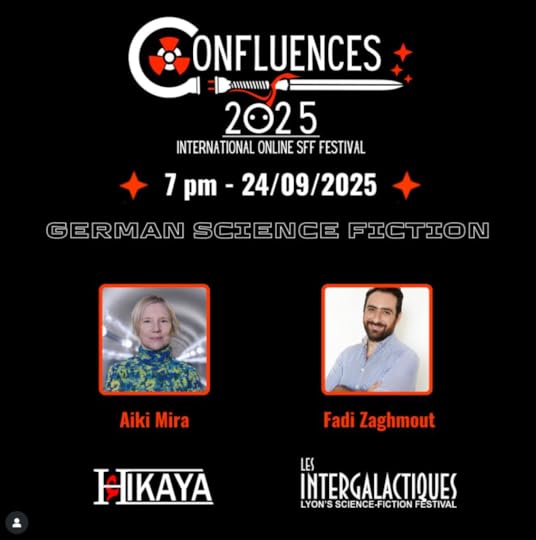
Aiki’s work dives into near-future and biopunk worlds, blending queerness,
AI, gaming, VR, and body modification with themes of identity, friendship,
and self-discovery. Aiki’s vision is bold, imaginative, and deeply human —
showing us not only the challenges of our future, but also glimpses of hope,
diversity, and resilience.
 Aiki Mira und Andreas Brandhorst, Science Fiction Literatur
Aiki Mira und Andreas Brandhorst, Science Fiction LiteraturIt was the first time for me to be the host and interview another SF author, and I really enjoyed the experience. I loved talking to Aiki and learning about their work and German SFF in general. And I am really thankful for Hikaya, for organizing this and giving me this chance.
If you missed watching the interview live, and are curious about Aiki and German SF, here is the youtube video for it. Hope you enjoy it!
September 17, 2025
I am going to Les Utopiales AND Toronto’s Festival of Authors this year!
I have been working on this since the beginning of the year. First, in January, I knew that The Man of Middling Height will be published by Syracuse University Press in August. I wanted to do a proper launch for it and was hoping that my friend Hani Yakan, who is an Event Coordinator at Toronto’s Festival of Authors (TIFA), would manage to get me invited to the festival this year. We discussed early, and although he said it was a possibility, no promised was made. I had to wait till June/July to get the official invitation letter.
Meanwhile, my publisher in France, Davide Knecht from Hikaya, was working hard to get me invited to the Les Utopiales this year. Hikaya published my book Heaven on Earth last year in French as Paradise Synthetique, and Davide has been a relentlessly advocating for me and my work since he translated my friend book to French, L’Epouse D’Amman in 2021. He was so excited when he secured for me and invitation to Les Utopiales in May. It was a big deal, for me as an author, and for Hikaya as a publisher to get invited to such an important festival, one of the biggest and most respected science fiction festivals in Europe, which is held every year in Nantes, France.
I was over the moon, having the potential of attending two important literary festivals across the Atlantic in same year. One (TIFA) is Canada’s largest and longest-running literary festival, a huge deal in the literary world. And the other (Les Utopiales), as stated above, one of the biggest and most respected science fiction festivals in Europe. At TIFA, I would launch The Man of Middling Height, and at Les Utopiales, I would promote my Sci-fi Eternal Youth trilogy and meet important European science fiction enthusiasts.
I wanted to do both, the problem was that both take place at the same time!!!! They start on 29th Oct and conclude on 2nd of Nov! Same week! same 5 days! Across the ocean!
STILL I WANTED TO DO BOTH!
I knew it is insane, and probably won’t work, but I thought why not trying? I can do first 2-3 days at Nantes then fly to Toronto and do a day or two. At that point I didn’t have TIFA’s official invite yet, so I proceeded with the French Visa. When TIFA’s invited arrived in July, I got excited and started the Canadian Visa process.
I thought everything was under control, telling myself that IT IS DOABLE, until I realized that my session in Toronto was initially set on Saturday, 1st of Nov at 3pm. When I communicated this to my French publisher, they were not happy. They knew that the most important days for Les Utopiales were Friday and Saturdays, and if I couldn’t make either, then it is not worth the participation. They insisted that I be there on Friday. When I communicated this to TIFA, they said initially that Saturday is the most important day for them and it is the day they usually have Arab authors session. It was very unlikely to change the date.
Doing either festival would be good for me, but I still wanted to do both. I didn’t want to choose. I didn’t want to skip either. So I went on google, and for few days kept trying all possible routes from Nantes to Toronto. Anything that would leave on Friday’s evening from Nantes, and arrive Saturday morning to Toronto. ANYTHING! A train to Paris? I initially thought I could make it, assuming the train would take 2 hours. Later I realized it would take 4! A connection through Amsterdam? Barcelona? Lisbon? Nothing worked.
It was IMPOSSIBLE.
When I talked to my friend Lana about how stressed I was trying to make it work, she said “I wish all stress is like that!”, which is so true. I was stressing about making such great opportunities work for me, when if either works, it is a big deal.
Nevertheless, TIFA’s, thankfully, tried to accommodate. I know, it put them under lots of stress, trying to reprogram, communicate to my fellow panelist, and move my session to the 2nd of November. And for that I am so thankful for Hani and the team. THANK YOU. It took few weeks, but today, it was confirmed! Communication is out, my session will be on Sunday, and I can leave Nantes comfortably on Saturday! Hurrayyyy. Also today, my participation at Les Utopiales got announced!
Going to Toronto means that I can fly to the US afterwards, and probably arrange for other book events over there. Nothing is confirmed at the moment, but I will let you know once it becomes clearer.
For now, I am so happy!
Still waiting for the Canadian Visa, but I still have time.

If you happen to be in Nantes end of October, please join us. The following two sessions are confirmed:
Session one:
Is technology our only hope or our greatest enemy? (La technologie est-elle notre seul espoir ou notre premier ennemi?)
In a science fiction genre that sees the return of dystopia and ultra-technological worlds, can we still believe that technology will save us? Can resistance also rise up against certain forms of technology or its use? How can we approach these new tools without turning them into saviors or enemies?
Date: 30 Oct (16:15-17:15)
Panelists: Pleynet Audrey, Ligny Jean-Marc, and me!
Session Two
Towards an intimate future (Vers un futur de l’intime)
Science fiction takes many forms and identities. Sometimes set in space, geopolitics, sagas, or standalone novels, it also explores more intimate themes through its relationship with intimacy and the future. How can we find this literary and forward-looking balance?
Date: 31st Oct (9:15-10:15)
Panelists: Minard Céline, North Emet, Roussin Simon, and me!

And if you are in Toronto on 2nd Nov, please join me and Ziyad Saadi at 4:30pm for a nice conversation on masculinity, identity and the quiet revolutions of everyday life.
Session Details:
Join Palestinian Canadian writer and filmmaker Ziyad Saadi and acclaimed Jordanian author and activist Fadi Zaghmout for a powerful conversation on masculinity, identity and the quiet revolutions of everyday life. Darkly funny, and full of surprises, Saadi’s Three Parties pays twisted homage to Virginia Woolf’s literary classic, Mrs. Dalloway – gleefully upending the western coming-out narrative, and exploring the traumas and pressures faced by Palestinian immigrants. In his groundbreaking allegorical novel, The Man of Middling Height, Zaghmout imagines a society whose deepest prejudices are about height – rather than race, gender, or sexuality – delivering a powerful meditation on discrimination and desire.
September 16, 2025
The Man of Middling Height – Concept Overview [video]
Google NotebookLM is an amazing learning tool. I used it to generate this short video that summarizes and explains the concept behind my latest book, The Man of Middling Height.
Check it out and let me know what you think.
September 8, 2025
The Best of The Markaz Review, 2020–2025 Celebrates Five Years of Independent SWANA Literature and Art
Proud to be among these authors, translators and artists, contributing a short story to this collection.
 The Best of The Markaz Review, 2020–2025
The Best of The Markaz Review, 2020–2025MONTPELLIER, SEPT. 2025 — The new book from The Markaz Review captures daily life in Gaza, Beirut, and Baghdad, among many other locales, exploring histories of struggle and resistance, highlighting artists and writers daring to imagine a better future. This landmark anthology is a showcase for cultures from the center of the world, a 7,000-kilometer expanse from Karachi to Casablanca.
“At The Markaz Review, we are part of a vast global community that loves freedom, literature, and the arts, and that abhors injustice,” said Jordan Elgrably, TMR’s editor-in-chief. “This book is a passport into an endlessly fascinating and enriching world — we hope readers will use it to travel freely and often.”
The review is an independent platform dedicated to publishing writers, artists, and translators from across Southwest Asia, North Africa (SWANA), and the diaspora, including Palestine, Lebanon, Iran, Iraq, Afghanistan, Morocco and beyond.
The anthology reflects on five years of publishing poetry, fiction, essays, visual art, and reviews. Divided into six thematic sections—Home, War, Revolution & Refugees, Art, Memory, and Hope, contributors include such acclaimed and emerging voices as MK Harb, Ghassan Ghassan, Joumana Haddad, Iason Athanasidis, Mansoura Ez-Eldin, Fadi Zaghmout, Mai Al-Nakib and Nabil Salih, alongside the artwork of Mohamed Al Mufti and Sara Shamma, among others, and poets including Mona Kareem, Lena Khalaf Tuffaha and Najwan Darwish.
The Best of The Markaz Review is both a celebration of the publication’s first five years and a declaration of its ongoing mission: to champion authentic voices from the Middle East, North Africa, and diaspora communities, and to affirm that culture, literature, and human dignity matter.
Availability: The anthology is available online at themarkaz.org, and through major booksellers. ISBN 9791097862305.
About The Markaz Review
The Markaz Review (TMR) is an independent, nonprofit literary and cultural journal founded in 2020. Published monthly online, TMR highlights original writing and art from across SWANA and the diaspora, with the aim of building bridges across communities and advancing freedom of expression. TMR editors have also curated the following titles: Woman Life Freedom: Voices and Art from the Women’s Protest in Iran (editor Malu Halasa, Saqi Books 2023); Stories from the Center of the World: New Middle East Fiction (editor Jordan Elgrably, City Lights 2024); and Sumūd: A New Palestinian Reader (editors Malu Halasa and Jordan Elgrably, Seven Stories Press 2025). The Markaz Review is supported by the Open Society Foundation, the Hawthornden, and other foundations and donors.
Press Contact:
natalie@themarkaz.org
http://www.themarkaz.org
August 31, 2025
August 2025 Recap: 5 books releases + interviews, reviews, mentions and podcasts!
If I had the ability to go back in time and talk to my younger self who started blogging 20 years ago, and tell him that one day he will be releasing 5 books in a single month, I know that he wouldn’t believe me.
Gosh, what would happen after 20 years?! wish my future self can tell me!
It has been a wild year for my writing career, but the month of August was the wildest, with everything falling into place; launching my third book in the eternal youth trilogy in Arabic – Farah Ala Al Ard, releasing The Man of Middling Height – my most anticipated english translation by Syracuse University Press, and publishing back in print my first 3 titles in English (The Bride of Amman, Heaven on Earth, and LAILA) by American publisher Rebel Satori Press!
Of course, each book brings attention to my whole body of work and media opportunities. Here is a recap for the main one happened this month:
6th AugustMood FM Radio interview in Amman with Rhona Danil

9th August
The Modern Novel blog mentions The Man of Middling Height
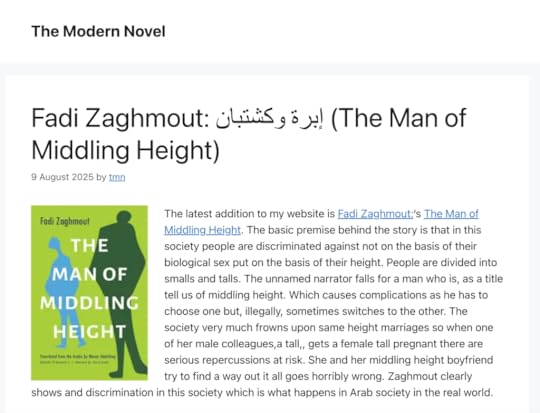 12th August
12th AugustDrinks with Tony podcast! – a fun chat with Tony about science fiction and latest book.
13th AugustOfficial launch event for Farah Ala Al Ard in Rainbow Theatre in Amman.
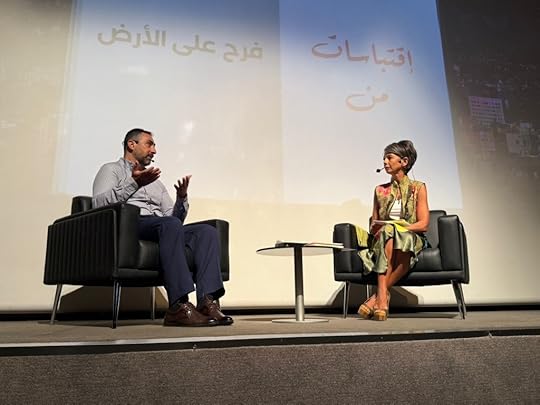 صور حفل إشهار فرح على الأرض15th August
صور حفل إشهار فرح على الأرض15th AugustOfficial release of The Man of Middling Height by Syracuse University Press in New York.
 15th August
15th AugustUnderrated Reads reviews The Man of Middling Height.
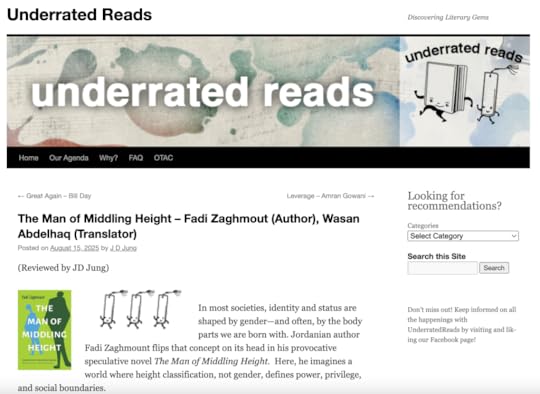 18th August
18th AugustSyracuse University Press introduces The Man of Middling Height in their Fall 25 season list of books.
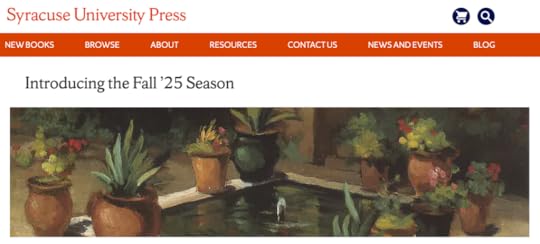 22th August
22th AugustMy interview with Shelf Awareness got released!
 26th August
26th AugustRebel Satori Press re-releases The Bride of Amman, Heaven on Earth and LAILA in a new print – paperback and ebooks versions
Welcome Back to the World The Bold Voice of Fadi Zaghmout
Rebel Satori Press
Rebel Satori Press is proud to announce the return of internationally acclaimed Jordanian author Fadi Zaghmout—a groundbreaking voice in contemporary Middle Eastern literature. His fearless storytelling explores identity, gender, and social transformation with a clarity that resonates across cultures.
Now available once more in paperback and ebook editions:Bride of Amman – A daring novel that challenges traditions while capturing the complexities of love, marriage, and personal freedom in modern Jordan.
Heaven on Earth – A visionary narrative weaving together science fiction, philosophy, and spirituality, exploring the search for a better, more compassionate world.
Laila – A powerful and intimate story of transformation, resilience, and self-discovery, told through one woman’s journey to claim her truth.
These essential works are available direct from Rebel Satori Press or wherever books are sold.
Step back into Fadi Zaghmout’s world—where bold ideas and unforgettable characters illuminate the path toward freedom and change.

Thank you everyone for the love and support! It keeps me going!
August 22, 2025
The Man of Middling Height Afterword by Cheryl Toman
Ms. Cheryl Toman, Professor of French and Chair, Modern Languages and Classics at The University of Alabama has been one biggest supporters and advocates for the publishing of the English version of The Man of Middling Height. She has been with me from the start, pointing out that Syracuse University Press rebooted their Middle East Literature in Translation Series, sharing with me the form to submit my manuscript, offering a generous subvention from The University of Alabama, and writing me this awesome Afterword for the book. She humbles me with her love and generosity. Thank you Cheryl, I will always be grateful for this.
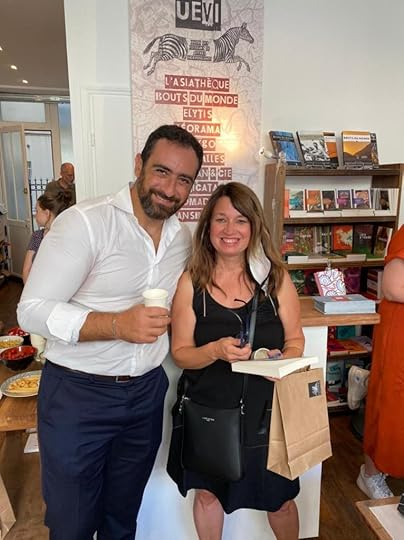 The first time I met Cheryl in person, in Paris 2021 during L’Epouse D’Amman launch event.
The first time I met Cheryl in person, in Paris 2021 during L’Epouse D’Amman launch event.A F T E R W O R D: Cheryl Toman
For some North American readers, The Man of Middling Height might be a first look into the literary universe of gender rights advocate Fadi Zaghmout, but in fact, this author’s novels and blogs have been recognized and celebrated in the Arab world and in Europe for more than a decade. Not only is Zaghmout arguably the most important Jordanian writer today, but he has allowed a new generation of Jordanian voices to be heard in transnational and transcultural discussions about gender and sexuality. The author of five novels originally written in Arabic with some already available in translation in the United Kingdom, France, and Italy, Zaghmout infuses into his texts characters, settings, and contexts specific to the Arab world but at the same time, he is speaking about universal issues and the struggle to overcome patriarchy and threats to one’s freedom and existence due to rigid written and unwritten rules governing gender and how and whom one can love. The Man of Middling Height proves that Middle Eastern writers can and do convey messages to which all readers can relate.
Zaghmout is not the first novelist that Jordan has ever produced, but in a sense he stands alone.
Of course, Zaghmout is not the first novelist that Jordan has ever produced, but in a sense he stands alone. As in other national literatures of the Middle East, the majority of Jordanian authors have placed war and conflict at the core of their writings. It was through creating and writing blogs that Zaghmout came to the realization that young Jordanians—like youth in other Arab countries—were desperately seeking out platforms and literature that spoke to them about the issues that were most important to them and Zaghmout finally gave them what they had been looking for. While threats of war and conflict do weigh upon all of those living in the Middle East, a younger generation of Arabs have grown weary of the expectation that they are destined to carry their parents’ historical baggage. Zaghmout arrived on the scene and fulfilled the need of a generation; he placed gender and sexuality at the center of his work and in doing so, he singlehandedly changed the face of Jordanian literature both within the country and beyond its borders. Zaghmout’s novels and his media presence have at times forced a necessary conversation about taboos and oppressive elements of Jordanian society and the Arab world—a conversation that many were ready to have. Although his writings at times create heated debate in Jordan, Zaghmout has indeed opened a dialogue that will eventually lead to undoing the dehumanization of non-conforming and / or gender-fluid citizens of the Arab world.
 With Cheryl, Safa Elnaili, Fil Inocencio Jr. at The University of Alabama Campus – April 2025
With Cheryl, Safa Elnaili, Fil Inocencio Jr. at The University of Alabama Campus – April 2025Experts of Middle Eastern literature are well aware that in recent years, Lebanese authors have been some of the first to expose taboos pertaining to sexuality and gender. Female protagonists in cosmopolitan Beirut dominate novels like Sahar Mandour’s 32 (2010, 2016) and Alexandra Chreiteh’s Always Coca-Cola (2009, 2012), to cite just two prime examples. A bit earlier in 2005, Saudi writer Rajaa Alsanea also earned worldwide acclaim for touching upon similar issues in her novel, Girls of Riyadh. All of these works are available in English translation. In 2012, however, Zaghmout’s The Bride of Amman complemented these works, showing readers that Jordanians, too, had much to say on this topic. But Zaghmout went a step further. Not only did he highlight female protagonists in his debut novel, but readers also empathized with gay characters who, despite the obstacles they face in their society, were presented in a positive light. Alexandra Chreiteh’s second novel, Ali and his Russian Mother (2010, 2015) also introduced a positive portrait of a gay character, Ali, into contemporary Middle Eastern, but her portrayal was much more subtle and nuanced. Zaghmout’s characters in The Bride of Amman brought issues clearly into the spotlight, and furthermore, all were navigating Jordanian society from the inside and not from the margins. Chreiteh’s Ali realized he could not live in Lebanon and thus he becomes a visitor and an outsider in his own country. Although Zaghmout’s characters do not always feel free in their society, there is no other “home” to which they can escape so they are determined to create their own local safe spaces.
But Zaghmout went a step further. Not only did he highlight female protagonists in his debut novel, but readers also empathized with gay characters who, despite the obstacles they face in their society, were presented in a positive light
In the Arab world especially, if not globally, social media has a potential to create a safe space for youth, an outlet for discussing taboos about sexuality and relationships that guarantees a certain anonymity in a virtual world where there are fewer rules and thus more freedom of expression. As technology advances at the speed of lightning, older generations have failed to keep up and to some extent, this reality has helped secure a space where Arab youth can express themselves far from the judgments and criticisms of their elders.

Fadi Zaghmout was born in 1978 in Amman, Jordan and he has lived in the Arab world nearly his whole life but his graduate work in creative writing at Sussex University in the United Kingdom also groomed him to become the prominent novelist he is today. His most widely read novel, The Bride of Amman, was actually published before embarking on this formal journey in creative writing. After earning his degree in England, he returned home to the Middle East, first back to Amman, and then to the United Arab Emirates. Zaghmout is a self-described feminist sexual freedoms and body rights advocate[1] who has been greatly inspired by pioneers like American scholar and philosopher Judith Butler and Egyptian essayist and novelist, the late Nawal El Saadawi. But he is also internationally recognized for his work, contributing short stories to magazines and collections, receiving invitations to speak about his writing, and most recently, he is the recipient of the British Council’s 2024 Study UK Social Action Award in the UAE.
It was after publishing The Bride of Amman that Zaghmout gravitated towards speculative fiction, and we see that his passion for this genre is evident in The Man of Middling Height.
It was after publishing The Bride of Amman that Zaghmout gravitated towards speculative fiction, and we see that his passion for this genre is evident in The Man of Middling Height. His first published science fiction novel from 2014, Janna Ala Al Ard, was translated by Sawad Hussein and published in English in 2017 as Heaven on Earth. This was followed by Laila wal Hamal in 2017, translated in 2020 by Hajer Almosleh into English as simply Laila. Zaghmout’s fourth novel, The Man of Middling Height first appeared in Arabic in late 2020 under the title Ebra Wa Kushtuban which literally translates as “a needle and a thimble.” The futuristic novel Amal Ala Al Ard (Hope on Earth) is his fifth novel, published in 2023.

Readers of The Man of Middling Height can certainly understand the reference to the needle and the thimble pervasive in this novel—set in an alternate universe where people are discriminated against according to height and not gender. Zaghmout poignantly illustrates here the absurdity of one group in society dominating another and he mocks the arbitrary and non-sensical way in which we determine societal hierarchy. The image conveyed by a needle and a thimble is about complementarity, and when these two work together, as they do in sewing, something wonderful can result, as Zaghmout deftly explains in The Man of Middling Height:
Zaghmout poignantly illustrates here the absurdity of one group in society dominating another and he mocks the arbitrary and non-sensical way in which we determine societal hierarchy.
What I learned in my younger years was that both the needle and the thimble are necessary; they complete each other’s work. One cannot succeed without the other and together they can create almost anything. In this, I felt it was exactly like our social fabric. It cannot exist or function without the cooperation of both talls and shorts. (40)
Zaghmout’s characters navigate urban society and they are like hundreds of real people one can encounter in day-to-day interactions in cosmopolitan Middle Eastern cities such as Amman. But these protagonists are presented in a way that make them familiar to both Arab and non-Arab readers alike. Zaghmout achieves this through emphasizing the commonalities that all people have shared at some point in their lives when exploring questions pertaining to sexuality, feminisms, and masculinities, ideas which all contribute to shaping one’s own identity in today’s turbulent world. As relatable as Zaghmout’s characters are in a novel such as The Bride of Amman, they are still unmistakably Jordanian and Zaghmout has effectively brought these voices into a conversation in which they had seemed absent before. However, how does one explain Zaghmout’s fictional, parallel world in The Man of Middling Height? No country is ever identified outright in the novel even if certain nuances lead readers to believe that the setting was inspired by the Arab world. But this is exactly what makes The Man of Middling Height so original. Middle Eastern literature should not be confused with ethnography and yet, many Western readers read it as such and have done so for decades. Here more than in any other of his novels, Zaghmout does not let us forget that sexual rights and human rights are inextricably linked and the issues pertaining to these rights are of universal concern.
As relatable as Zaghmout’s characters are in a novel such as The Bride of Amman, they are still unmistakably Jordanian and Zaghmout has effectively brought these voices into a conversation in which they had seemed absent before.
In her book, Bad Girls of the Arab World (2017) Jordanian literary scholar Rula Quawas is critical of those individuals in Arab societies who are actually the “maintainers and keepers of traditional values which they fail to recognize as arbitrary” (27). Quawas’s observation is exactly what motivates Zaghmout to adopt the approach that he has in writing The Man of Middling Height. Zaghmout has found a most clever way to demonstrate the arbitrariness of traditional values in society and chooses to classify the population by height instead of gender. Is this idea absurd? In any case, Zaghmout convinces us that it is not any more ridiculous than the importance placed upon gender and gender roles in a system to which society has been clinging for centuries. It cannot be denied that half of the population has been assigned power based solely on the genitalia with which they were born.
Zaghmout has found a most clever way to demonstrate the arbitrariness of traditional values in society and chooses to classify the population by height instead of gender.
Keeping in mind that The Man of Middling Height finds itself firmly rooted in the genre of speculative fiction, Zaghmout has imagined a parallel universe created to attack the rigid gendered worlds in which we all live. This is an especially helpful technique when analyzing more conservative societies which one might find in the Arab world, but it also allows anyone from any culture to view society through a more objective lens. Zaghmout is one of a few Arab artists and writers who have chosen such an approach to make a bold statement. In summer 2024, the exhibit ARABOFUTURES: Science Fiction and New Imaginaries[2] opened at the Institut du Monde Arabe (IMA) in Paris, France and it explores the notion of using genres such as speculative and science fictions in Arab art and literature precisely in the manner in which Zaghmout has done. An invitation into the “dreamed worlds of the new Arab imaginings,” the exhibit features artistic and literary means of “decolonizing the future.” Zaghmout’s use of speculative fiction in The Man of Middling Height becomes a tool to “subvert globalized codes and aesthetics,” allowing them “to question the ideologies they convey or to imagine off-center futures that break with hegemonic discourses” (2024). The IMA exhibit claims that from science fiction, numerous “hybrid, post-human imaginaries” have emerged and this has become a trend for artists and writers of the Arab world since the dawn of the millennium, “exploring ‘programmed’ futures germinating in our present.” This is certainly evident in The Man of Middling Height, but also in Zaghmout’s most recent futuristic novel, Hope on Earth, in which the protagonist is a non-binary person, born female, but not committed to either gender and thus choosing male pronouns for the lack of neutral pronouns in the Arabic language. Zaghmout’s novels imagine more inclusive futures and these are at the heart of ARABOFUTURS. Since the year 2000, artists from the Arab world and its diasporas have been using science fiction to explore the flaws in our immediate future and to dream the worlds of tomorrow. Through anticipation, they draw up a straightforward assessment of the evolution of our current societies, questioning the present and transgressing it. (2024)[3]
 With Cheryl and a group of students studying Arabic language at The University of Alabama
With Cheryl and a group of students studying Arabic language at The University of Alabama What is revolutionary about Zaghmout’s novel translated here is that it does not present a binary society. That is, “talls” and “shorts” in the novel are not just simply replacements for men and women. The presentation of his characters is much more complex and nuanced than this, which is what makes this novel so intriguing to read. Zaghmout has provided readers with an absolutely brilliant way of introducing gender fluidity in Middle Eastern literature; the protagonist Tallan, for example, is “neither tall nor short” (40): “He was not like a needle. Nor was he a thimble. Thus, he was not fit to play a role in the construction of our social fabric” (40).
Zaghmout has provided readers with an absolutely brilliant way of introducing gender fluidity in Middle Eastern literature
The Man of Middling Height might be Zaghmout’s most innovative work to date. For those who have no knowledge of the Arabic language, it is impossible to fully understand just how difficult it was for Zaghmout to essentially modify the gendered contexts in the Arabic language and still have the novel make sense. Likewise, it was no simple feat on the part of the translator, Wasan Abdelhaq, and text editor, Fil Inocencio Jr., to capture and fine tune all the nuances from the original Arabic since English has its own gendered patterns that are at times not even remotely comparable to Arabic. For those readers familiar with Arab societies, certain details are readily recognizable (the tendency to frown upon public displays of affection, the notion of marriage as essential to maintaining the fabric of society, the widespread unacceptability of assuming a gender that is not yours at birth, illustrated in the novel as the rejection of those who “feel tall” even if they are not, etc.). Yet, Zaghmout achieves his aim to make everyone at least somewhat uncomfortable with the way we classify people in society; we are all made to recognize our faults and the devastating consequences that they have.
The Man of Middling Height might be Zaghmout’s most innovative work to date.
There is literally no other literary work quite like this particular novel – neither in the Arab world nor outside of it. Zaghmout’s novel not only allows us to meander around certain societal taboos in order to more openly discuss them, but it also shows us that the identities we have assigned to others are nonsensical. In the worst-case scenario, as is illustrated in The Man of Middling Height, this absurdity can provoke violence and claim many victims. With this novel, Fadi Zaghmout has once again demonstrated his brilliance and versatility as a writer, experimenting with literary genres and succeeding in conveying the message that has always been a hallmark of his work.
Works Cited:
— Alsanae, Rajaa. 2005. Banāt al-Riyāḍ. Dar al-Saqi.
—. 2007. Girls of Riyadh, trans. by Rajaa Alsanae and Marilyn Booth. Penguin Books.
— ARABOFUTURS: science-fiction et nouveaux imaginaires. April 23, 2024-Jan. 12, 2025, Institut du Monde Arabe, Paris.
— Chreiteh, Alexandra. 2010. ʻAlī wa-ummuhu al-Rūsīyah. Arab Scientific Publishers.
—. 2015. Ali and His Russian Mother, trans. by Michelle Hartman. Interlink.
—. 2009. Dāʾiman Coca-Cola. Arab Scientific Publishers.
—. 2012. Always Coca-Cola, trans. by Michelle Hartman. Interlink.
—- Quawas, Rula. 2017. “Inciting Critique in the Feminist Classroom.” Bad Girls of the Arab World by Nadia Yaqub and Rula Quawas, eds. University of Texas Press, 21-36.
— Mandour, Sarah. 2010. 32. Dar Al-Adab.
—. 2016. 32, trans. by Nicole Fares. Syracuse University Press.
Yaqub, Nadia and Rula Quawas, eds. 2017. Bad Girls of the Arab World. University of Texas Press.
— Zaghmout, Fadi. 2012. Aroos Amman. Jabal Amman Publishers.
—. 2012. The Bride of Amman, trans. by Ruth Kemp. Signal 8 Press.
—. 2020. Ibra Wa Kushtuban. Al-Ahleyya.
—. 2015. Janna Ala Al Ard. Dar Al Adab.
—. 2017. Heaven on Earth, trans. by Sawad Hussain. Signal 8 Press.
—. 2017. Laila wal Hamal. Kotob Khan Publishing.
—. 2020. Laila, trans. by Hajer Almosleh. Signal 8 Press.
—. 2023. Amal Ala Al Ard. Dar Al Ahleyya.
[2] ARABOFUTURS: science-fiction et nouveaux imaginaires is a special exhibit featured at the Institut du Monde Arabe (IMA) in Paris from April 23 to January 12, 2025. The link to the exhibit can be found here: https://www.imarabe.org/fr/expositions/arabofuturs-science-fiction-et-nouveaux-imaginaires.
[3] This quote is featured on the introductory wall panels of the exhibit Arabofuturs at the IMA in Paris. It mentions “science fiction” keeping in mind that futuristic genres and speculative fiction were once categorized under science fiction. We see the progression of those genres within the actual exhibit.



